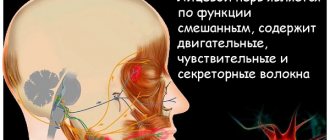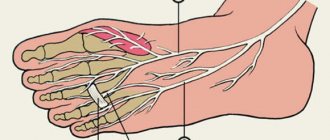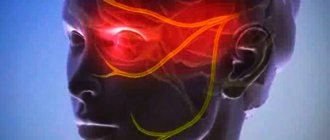Functions of the vagal nerve
Having figured out where this nerve is located in a person, you should understand its functions. This nerve is formed from motor, sensory and secretory fibers, which determines its functions.
Under normal conditions, the vagus nerve provides the following functions:
- swallowing process;
- gag reflexes;
- stomach function;
- coughing;
- breath;
- contraction of the heart.
As it becomes clear, damage to this nerve can cause a number of different symptoms. If for some reason it completely stops performing its function, there is only one possible outcome - death, since the person’s heart will simply stop.
Vagal lesion clinic
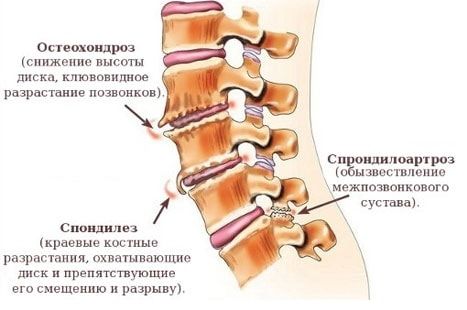
Degenerative diseases of the spine can cause vagal impingement
If the tone of the vagus nerve is high, a person has good physical health, everything is in order with his psyche, and he is resistant to stress. When pinched or inflamed, the tone is low. As a result, the following symptoms may appear:
- problems with speech – hoarseness or loss of voice (with unilateral damage, paralysis of the vocal cord is observed);
- sore throat, heartburn;
- difficulty swallowing solid food (occurs when the glossopharyngeal nerve, which originates from the same nucleus where the vagus originates);
- with dental diseases, toothache increases;
- hiccups;
- indigestion due to increased muscle tone of the esophagus;
- problems with stool;
- heaviness in the stomach, dull pain in the left hypochondrium, side, in the center of the abdomen under the sternum;
- headache, dizziness;
- hearing loss, noise in the ear, deafness;
- irritability, weakness, chronic fatigue;
- memory impairment;
- depression;
- panic attacks;
- changes in blood pressure;
- overweight, obesity, bulimia, anorexia.
When the nerve process is damaged, the likelihood of cardiovascular diseases (arrhythmia, bradycardia, tachycardia, heart attack), autoimmune processes, Alzheimer's disease, epilepsy, and rheumatoid arthritis increases.
Symptoms of the disease
When the vagus nerve is damaged, symptoms and treatment largely depend on which area is damaged. Diseases of the vagus nerve are accompanied by the development of a number of unrelated symptoms:
- brain;
- neck muscles;
- thoracic region;
- gastrointestinal tract;
- heart and blood vessels;
- vegetative system.
The most common symptom is a severe headache and pain in the middle ear, which is a consequence of a violation of a section of the nerve located in the skull.
The vagus passes through the neck, and if this area is damaged, a violation of swallowing function develops, up to complete paralysis, which can cause breathing problems and death from suffocation. Damage to this area is often accompanied by a change in voice.
The lesion may be located in the thoracic region, then symptoms of pneumonia, pain in the chest, difficulty breathing, and inability to cough develop.
On the side of the gastrointestinal tract, digestive disorders, diarrhea, stomach pain, nausea and vomiting are possible.
The most pronounced symptoms are problems with the functioning of the cardiovascular system - pain in the heart area, decreased heart rate.
When the vagus nerve is irritated, the autonomic system reacts by decreasing or increasing tone. With decreased tone, increasing irritability, restlessness, and fussiness are observed. The person becomes hot-tempered and reacts aggressively to stimuli. Increased tone is manifested by apathy, drowsiness, and decreased response to stimuli.
What is the vagus nerve and where is it located?
There are 12 paired nerves coming from the cranium. They carry signals from the brain that regulate the activity of certain organs. The vagus nerve (medically called vagus) is the 10th pair.
It passes through the cervical region into the chest and further into the abdominal area. It transmits impulses to the organs that ensure the vital functions of the body. When signal transmission is disrupted, the activity of these systems (cardiovascular, pulmonary, digestive) occurs.
Pinched nerve
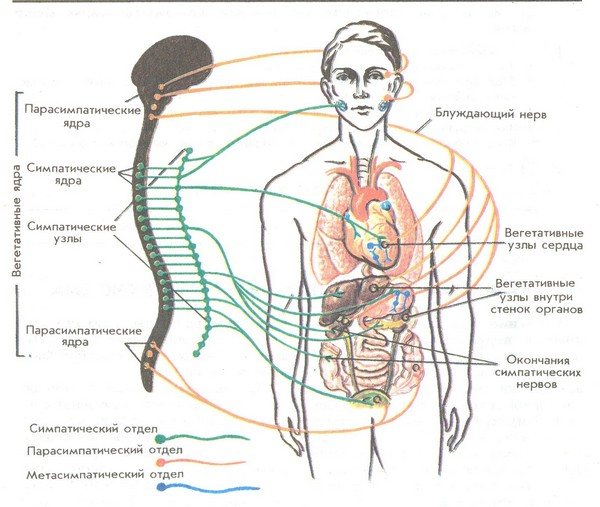
When this nerve is pinched, the area in the skull reacts with sudden migraines. This is a condition in which severe pain occurs, localized in one part of the head.
When pinched, angioneurosis or neurasthenic syndrome develops. The lesion may be accompanied by Meniere's syndrome, the characteristic symptoms of which are dizziness and hearing loss.
Due to a disorder of the peripheral nervous system, circulatory disorders in the lower extremities are possible. A characteristic sign of this condition is pale skin.
Arrhythmia and its causes
Arrhythmia is any disorder associated with a disturbance in the regularity or frequency of the heartbeat and the electrical conduction of the heart.
The term arrhythmia combines disorders of various origins and symptoms associated with the origin and flow of electrical impulses in the heart. They are formed due to disorders associated with the cardiac conduction system, which must ensure periodic regular contractions of the myocardium, or rather correct sinus rhythm. Arrhythmia can cause serious disturbances in the functioning of the heart or in the functioning of other organs, or become an independent complication that provokes the occurrence of severe pathologies. Statistics show that about 15% of cases of heart rhythm disturbances cause death. Arrhythmology is a branch of cardiology that studies the diagnosis of arrhythmias of various origins.
Correct rhythmic heartbeat occurs thanks to the muscle fibers in the myocardium, which make up the conduction system of the human heart. The conduction system sets a certain rhythm, sequence and frequency of contractions of the atria and ventricles. Improper functioning of this system causes the development of arrhythmia and conduction disorders. In this case, the clear activity of the ventricles and atria is disrupted.
Based on the causes and manifestations of arrhythmias, they can be divided into two groups:
- arrhythmias associated with cardiac pathology – organic;
- arrhythmias unrelated to cardiac pathologies are inorganic.
The main companions of cardiac abnormalities and complications after heart surgery are forms of organic arrhythmias.
The basis for the development of organic arrhythmia is damage to the heart muscle, which complicates the correct delivery of the electrical impulse from the heart to its parts. Sometimes the damage reaches the sinus node, and this is the basis of the rhythm.
Sympathetic-dependent arrhythmias of neurogenic origin develop due to excessive activation of the tone of the nervous system of the sympathetic node due to stress, emotions, intense physical or mental stress, consumption of alcoholic beverages, smoking, etc. Activation of the tone of the sympathetic node contributes to the occurrence of thyroid diseases, fever, blood diseases, and the production of viral toxins.
Vague-dependent neurogenic arrhythmias are the activation of the parasympathetic system of the human body, especially the vagus nerve. Vago-dependent deviations in the heartbeat rhythm appear, as a rule, at night and provoke the development of diseases of the gallbladder, intestines, stomach, and bladder, in which the vagus nerve is activated.
Diselectrolyte arrhythmias appear in the process of imbalance of electrolytes in the myocardium and in the blood, especially potassium, magnesium, and sodium.
Iatrogenic heart rhythm disturbances begin to appear due to the arrhythmogenic effects on the body of certain medications, such as cardiac glycosides, beta blockers, diuretics, sympathomimetics, etc. Mechanical arrhythmias occur as a result of chest trauma, blows, falls, or electric shock. Idiopathic arrhythmias are abnormalities in the heart rhythm without identifying an underlying cause.
With the development of various types of arrhythmia, the main importance is given to a person’s hereditary predisposition to certain deviations in health.
02:10 chaotic. about many people in one day
half an hour. 30 minutes. this is one minute plus another one and so on thirty times. this is when you stand in the center of the hall, counting trains, each time thinking that this is the last one and after it you tell everything to hell, and still it passes, and you stand and think that maybe on the next one. And in the tube: “ I’ll be there soon” for me 30 minutes is a lot. Yana, you are not the Queen of England, understand this. I'm not going to wait for you. and period. and I don’t need to smile like that. I will never go anywhere with you again. I'm not your friend. remember this well.
*and also promise to call and no call. What the hell is this anyway? I can't stand it.
but in the evening we read poetry vying with each other and don’t care that you don’t like Akhmatova. you still know her poems by heart. and wandered around the streets. and then they brought me Dante. thanks a lot
Nerve stimulation
Vagus nerve stimulation is used in the complex treatment of epileptic seizures in patients. Stimulation of the vagus nerve is carried out by implanting a device that generates impulses. During an attack of epilepsy, chaotic impulses are sent from the brain. Stimulation of the vagus nerve allows you to get rid of seizures due to the effect of electric current on it.
Stimulation of the vagus nerve helps improve the patient’s condition, but is accompanied by a number of risks that can develop if implantation is performed incorrectly.
Complications and prognosis
With timely treatment, compliance with specialist recommendations and methods of stimulating the activity of the vagus nerve, the disease is eliminated. In the absence of therapeutic measures, the activity of important organs, including the lungs and heart, is disrupted. If the pathology is severe, death is possible.
The vagus nerve regulates the functioning of the cardiovascular, respiratory and digestive systems. When it becomes inflamed, irritated or upset, symptoms of dysfunction of vital organs appear. To eliminate the pathology, a complete examination by a neurologist and compliance with complex treatment are required.
Kotlyachkova Svetlana
Article design: Mila Friedan
Causes of diseases

For the development of any disease, causes and provoking factors are necessary. Diseases that may affect the vagus nerve are:
- diabetes;
- severe chronic diseases;
- meningitis;
- multiple sclerosis, stroke, aneurysm;
- tumor growth in the brain;
- intoxication of the body.
In diabetes mellitus, glucose absorption is impaired. If the sugar level is very high for a long time, the process of weakening the vascular walls begins. This causes poor circulation and the development of stagnant processes, which can result in damage to the nervous system and vagus nerve.
Severe chronic diseases that lead to nerve damage include:
- tuberculosis;
- AIDS;
- sinusitis;
- Parkinson's disease.
With chronic sinusitis, there is a high probability of infection spreading through the bloodstream throughout the body and, consequently, the development of an inflammatory process in the nerve structure.
Alcoholism often leads to the development of neuralgia. In most cases, damage to the vagus nerve is noted. The disease can develop due to intoxication of the body with heavy metals or chemicals.
Also, damage to this nerve often occurs due to injury caused by a sharp bend of the neck back, for example, during an accident or during extreme sports.
Soothing aromatic pillow
To normalize the activity of the vagus nerve at night, it is recommended to use an aroma pillow. You can also relax on it during the daytime.
The pillow contains:
| Composition of herbs | Brief description of them |
| Oregano | Facilitates the process of falling asleep, has a calming effect |
| Lavender | Normalizes the activity of the pulmonary system (evens out the breathing rhythm). |
| Bay leaf | Has a calming effect and normalizes the functioning of the pulmonary system |
| Melissa | Used as a sedative in the composition. Highly effective |
| Mint | Activates the activity of nervous system cells and normalizes the breathing process |
| Chamomile | Has a calming effect. Helps eliminate headaches |
| Thyme | Reduces headaches and normalizes the activity of nervous system cells |
| Hop cones | Facilitate the process of falling asleep and ensure sound sleep. |
If you have an allergic reaction to the components of the composition, it is prohibited to use the pillow. If only one plant is intolerant, it can be removed.
Diagnostics
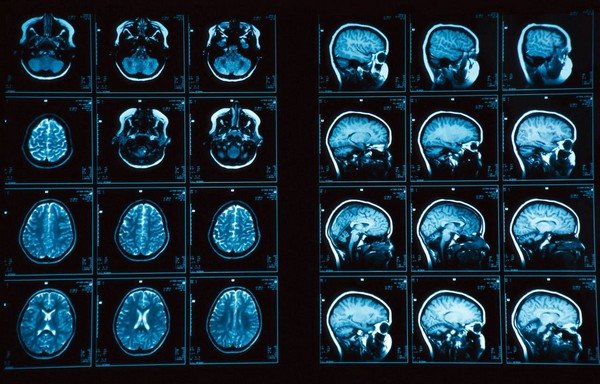
If one of the above symptoms appears, you should immediately consult a neurologist. The diagnosis is made after analyzing complaints and examining the patient. Diagnostics includes the following examinations:
- Brain MRI;
- chest x-ray;
- examination using a laryngoscope.
The neurologist can refer the patient to an otolaryngologist for a comprehensive examination for chronic diseases.
How does a neurologist identify symptoms of neuralgia in adults?
Your appointment with a neurologist will begin with you having to answer some questions:
- How long have you been having pain?
- Describe the pain. What are they? Stitching, burning, aching, pulling?
- What chronic diseases do you suffer from? What illnesses have you suffered recently?
- What medications are you taking?
A neurological examination will then be performed. The doctor will not only evaluate the location of the pain, but also the sensitivity of the skin, muscle strength and tone, and reflexes. This is necessary in order to identify or exclude neurological diseases that could cause signs of neuralgia. If the pain is localized to the face, you may be referred to a dentist for an examination. The cause of the symptoms could be a dental abscess , a disease that can lead to serious complications.
Traditional Treatments
Once the diagnosis is made, the doctor prescribes drug therapy. Typically, when the vagus nerve is damaged, treatment includes hormonal drugs for a quick effect. The patient is also advised to take antihistamines to relieve swelling of the affected nerve. Be sure to take care of strengthening the entire nervous system; for this, B vitamins and medications containing magnesium are used.
After the main symptoms have been relieved, the doctor may prescribe a course of physiotherapeutic procedures. Electric current methods are usually used to help restore normal function of the affected nerve and improve local metabolic processes.
Treatment of neuralgia symptoms in adults
If the cause of the disease cannot be found, treatment will be symptomatic, that is, aimed at combating the main symptom – pain. Non-steroidal anti-inflammatory drugs are usually prescribed .
If this does not help, a blockade of the damaged nerve is performed: an anesthetic solution is injected at the place where it passes. In severe cases, if the pain cannot be managed in other ways, narcotic painkillers are used.
We will call you back
Leave your phone number
Neuralgia is a condition caused by nerve damage, which can occur for various reasons. Nerve fibers in the human body are surrounded by myelin - a special sheath consisting of fats. It can be compared to the insulation of an electrical wire, with only one caveat: unlike conventional insulation, the myelin sheath is important for the normal transmission of nerve impulses. Damage or deterioration of myelin can lead to neurological disorders.
Sometimes the cause of neuralgia cannot be determined. In this case, it is called primary , or essential . Secondary neuralgia is always a symptom of some other disease.
Traditional methods of treatment

Traditional medicine knows how to treat various pathologies. However, the effectiveness of such treatment remains controversial. There are methods to restore the function of the affected vagus, but it should be remembered that alternative methods should not replace traditional drug treatment. Alternative treatment can be used in addition to therapeutic methods and only after consulting with your doctor.
Treatment with medicinal herbs will slightly improve the patient’s condition, but will not completely eliminate the disease, so such methods can be used at your own peril and risk.
- Thyme helps get rid of nervous tension; it is recommended to drink 50 ml daily. To prepare the decoction, boil a large spoonful of dried flowers in 50 ml of water for ten minutes.
- Another mild sedative is a mixture of mint and lemon balm. To prepare a decoction, pour 10 g of a dry mixture of herbs into 300 ml of boiling water and leave until it cools completely. The decoction should be taken daily, one glass.
- Hot baths with medicinal herbs are also used for treatment, which help relieve muscle hypertonicity. To prepare a healing bath, you need to mix 20 g of calamus, oregano, pine buds and yarrow and pour five liters of boiling water. The infusion should stand for at least five hours, and then it is filtered and poured into a bath of water at a comfortable temperature. The time for taking such a bath is 20 minutes, the frequency is daily.
- Another healing bath is to mix mint, calamus, lavender flowers and prepare a bath.
- You can also use valerian root and sage to prepare healing baths.
It should be understood that traditional methods of treatment can only temporarily relieve symptoms and improve psycho-emotional well-being. It is advisable to use such methods for sleep problems, since calming medicinal herbs have a positive effect on the nervous system and help you fall asleep quickly.
Only drug therapy can completely cure the disease, but healing does not happen in a single day. Complex treatment takes a long time, sometimes it can take even a month to fully restore vagal function.
Prevention

The vagus performs very important functions, so if it is damaged, life-threatening symptoms may develop. To avoid this, you should adhere to the following rules:
- balanced diet;
- absence of bad habits;
- light regular physical activity;
- lack of stress;
- taking vitamins for prevention;
- maintaining blood vessels and muscles in tone.
A balanced diet involves a maximum of healthy foods, fruits and vegetables, and a minimum of processed foods and street food. Smoking and alcohol abuse are the main enemies of healthy nerves; these habits should be abandoned without regret.
A daily routine, adequate sleep, physical activity and walks in the fresh air will help ensure the absence of stress. To keep your body in good shape, neurologists recommend daily contrast showers.
If it was not possible to avoid the development of the disease, it is important not to delay a visit to the doctor, because only timely treatment will avoid complications.

